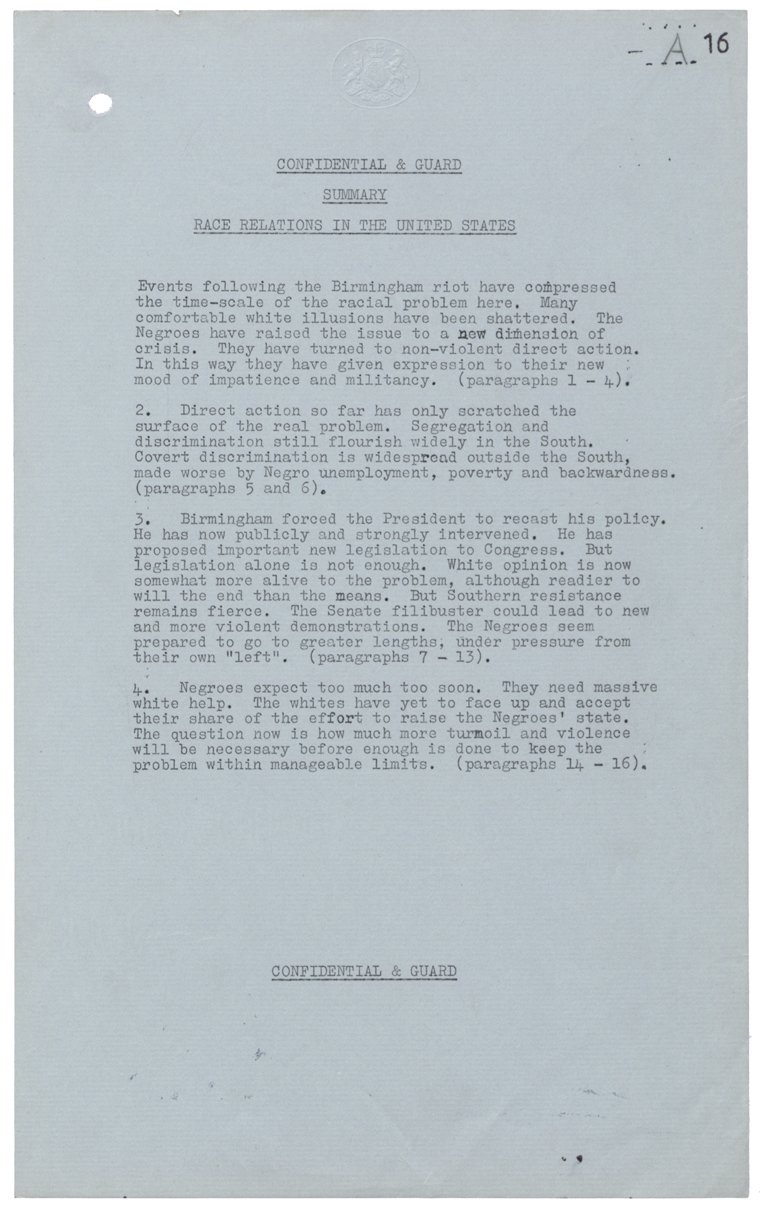
Letter from British Embassy in Washington to Foreign Office, July 29th 1963 (FO 371/168485)
Transcript
CONFIDENTIAL & GUARD
British Embassy,
WASHINGTON.
July 29, 1963
Dear Bernard,
Thank you for your letter of July 26 about the Chief of Defence Staff’s enquiry on Civil Rights and internal security here.
2. We are in fact nearing completion of a Despatch on this subject, but on looking at the Draft I find that was one aspect which, as you thought, we had not covered. The reason was that our analysts had led us to the conclusion that there was no significant threat to internal security at the present time – certainly not of such a degree as to affect United States defence commitments overseas.
3. It is of course true that a number of Southern segregationist politicians have tried to make people’s flesh creep by painting lurid pictures of the disorders which would follow if the present spate of Negro demonstrations were to be supplemented by the new civil rights legislation at present before Congress. The raging Governor Wallace of Alabama, for example, specifically told a Senate Committee that the American troops in Vietnam, Berlin and elsewhere would be needed to enforce any law prohibiting segregation of public accommodations. However, the Southerners said much the same at the time of the Supreme Court’s school desegregation ruling in 1954, and the only Federal action that has been called for has been the use of Federal marshals on one or two occasions, and the Federalisation of units of the National Guard in 1957 at Little Rock and 1962 at Oxford, Mississippi. Even assuming that the demonstrations continue to grow in number, size and distribution over the country, and assuming furthermore that in some cases they produce violence, the National Guard, which is over 400,000 strong, should be more than enough to provide any necessary support for the local law enforcement agencies. Furthermore it would be a political admission of defeat of the first order for any United States Administration to withdraw forces from overseas for purposes of maintaining order here.
4. One of the main points which we shall be making in our despatch is that unlike colonial independence movements the Negroes here still want “in”. Although militant direct action is now their preferred method for putting pressure on the whites to relieve their injustices, the present evidence is that integration leaders, rather than the somewhat crazy “separatist” Black Muslims and the like, retain the loyalty of the vast majority of Negroes. This has a bearing on the character of the protests. I would judge that even in a worse situation than now seems likely, for example with effective legislation blocked by a filibuster and no early relief in sight for Negro poverty and unemployment, the security threat from the more vigorous protests that would ensue would be considerably less than, say, in 1919, when there were twenty-five major race riots in cities outside the South in six months and when the hope of redress represented by a sympathetic President and Supreme Court did not exist.
5. The short answer to your question, therefore, is that I do not believe that the racial situation, disquieting though it is, calls for serious consideration of the possibility of troop withdrawals from NATO or elsewhere. But we shall of course continue to watch the situation and make considered reports from time to time.
Yours ever
Denis Greenhill
(D. A. Greenhill)
